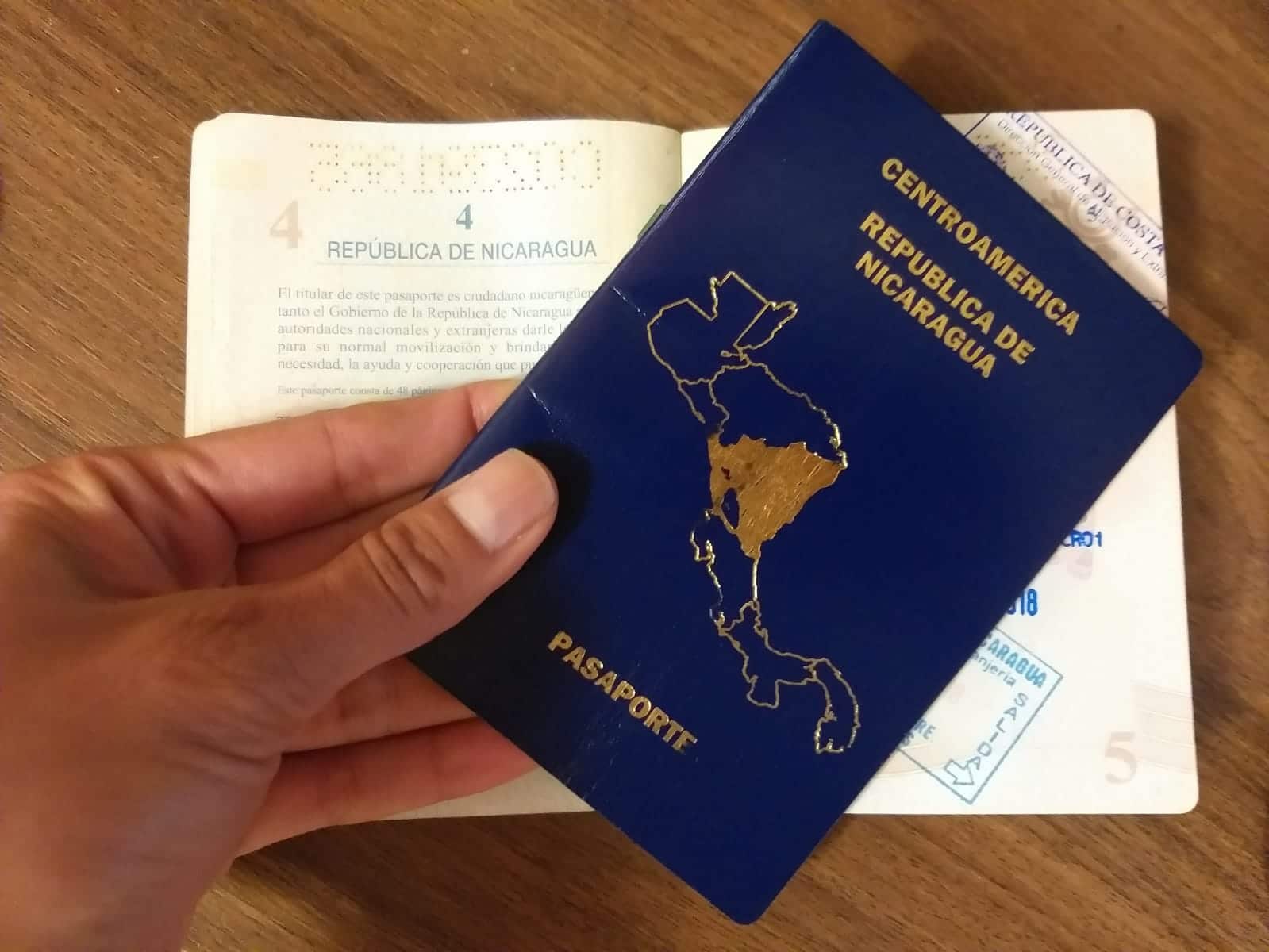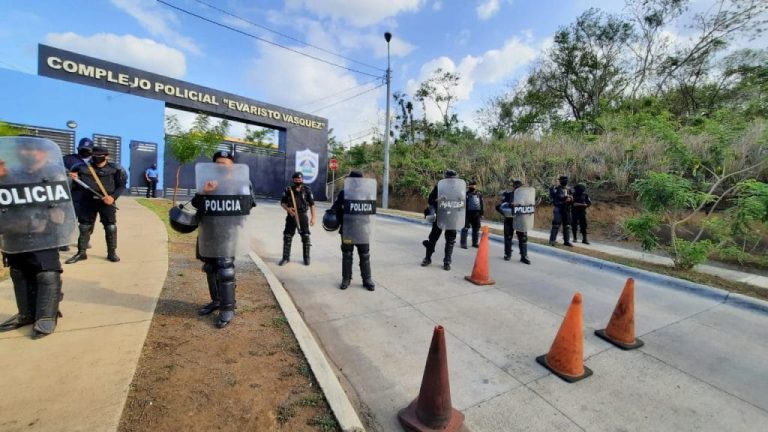26 de octubre 2022

Nicaragua: Public Employees Hindered from Traveling to USA

PUBLICIDAD 1M
PUBLICIDAD 4D
PUBLICIDAD 5D
All charges have the same format. They are fabricated in series. They do not bother to specify individual participation

La cárcel el Chipote es en la que se encuentran recluidos la mayoría de ciudadanos condenados por supuesta "conspiración y noticias falsas". Foto: Confidencial | Archivo.
The dictatorship of Daniel Ortega uses the crimes of “conspiracy to undermine national security” and “spreading fake news” to fabricate cases against Nicaragua’s political prisoners, executed by a manipulated judicial system, which lawyers and human rights defenders describe as a “repressive arm” of Ortega’s political apparatus.
In collusion with the Judiciary, the regime has convicted 45 political prisoners for “conspiracy,” with sentences ranging from seven to thirteen years in prison, among them the seven presidential hopefuls arrested in the repressive escalation of 2021. In addition, fourteen of those 45 political prisoners have also been tried and convicted for allegedly “spreading fake news,” and this happened without clear evidence to prove criminal responsibility, according to defense lawyers.
The fabrication of crimes is repeated against a score of prisoners of conscience, detained in 2022, which includes relatives of those politically persecuted, workers of the confiscated newspaper La Prensa, and six priests and a layman who were surrounded for 15 days together with Monsignor Rolando Alvarez in the Matagalpa Curia and then taken to the El Chipote jail. The bishop has been under “house arrest” for more than two months.
In less than fifteen days, the Ortega regime’s Prosecutor’s Office charged 24 Nicaraguans —twenty political prisoners and four with arrest warrants—, with “conspiracy to undermine national security” and nine of them also for allegedly “spreading fake news.”
The exiled lawyer and former judge, Yader Morazan, analyzed the accusations against these last political prisoners and affirms that none of them meets the requirements of explaining the implication of the accused in the alleged crimes.
Morazan explained that the crime of “undermining” only applies to people who hold power, and this is not the case of any of the twenty common citizens who are detained in some cases as hostages to threaten politically persecuted relatives who are in exile.
Additionally, he said that the Special Cybercrimes Law, approved in October 2020 as part of a package of repressive laws against the population, also does not define what is fake news. Article 30 of what’s known as the“Gag Law” states that “whoever, using information and communication technologies, publishes or disseminates fake and/or distorted information, which produces alarm, fear, anxiety, in the population, or to a group or sector or to a person or his family, brings a penalty of two to four years in prison and three hundred to five hundred days fine will also be imposed.” However, there is no way to legally determine what is and what is not a fake news. And “how do you measure anxiety, socially speaking?” asked Morazan.
“Since 2018 there is a common pattern. All charges have the same format. They are fabricated in series. They do not specify individual participation, they do not specify facts that are attributable or constitute a crime, but they say, “conspiracy to undermine the territorial identity, but it does not say in what way they did it, how, when, where, or what they did,” he emphasized.
Part of the 20 political prisoners of 2022 who are being processed were captured in a repressive wave that the regime unleashed, between September 4 and 18, against members of the Democratic Renewal Union (UNAMOS, formerly MRS). In several cases, the Police detained them when they did not find the opponent they were looking for, according to what the politically persecuted Javier Alvarez Zamora and Andrea Margarita del Carmen denounced to Confidencial.
This new course of action has been considered by human rights organizations as a new “repressive pattern” by the regime.
A defense lawyer, who requested anonymity for fear of reprisals, assesses that the Government is sending a two-way message. First, to its bases, to reinforce the theory that these people are spreading fake news and conspire against the Government; the second, for the whole population, threatening with imprisonment anyone who dares to speak their mind.
“(The message is) we accuse you that it is fake because we do not need to prove that it is fake. I simply need to accuse you and the judicial apparatus will find you guilty,” warned the lawyer who has followed up the political trials.
The lawyer also explained that the regime has used different crimes to imprison political prisoners since the outbreak of the April Rebellion in 2018. In that year they charged hundreds of prisoners of conscience for terrorism; in 2019 they opted for common crimes and drug trafficking predominated and, as of 2021, they have applied the repressive laws passed in 2020, prevailing the crime of “conspiracy to undermine” and spreading of “fake news.”
In the political trials carried out inside El Chipote during February and March, the Prosecutor’s Office did not present a single piece of evidence to prove what was fake news, the lawyer stressed. “What is important to the Government is trying to say that all news that is not theirs is false. They are lies, and that is why they are imprisoning these people,” he affirmed.
Another lawyer, who has participated in the defense of political prisoners and who also requested anonymity, said that the Police, the Prosecutor’s Office and the Judiciary do nothing more than follow the same script as in previous cases: the Police already know what to mention in the reports, the prosecutors maintain the same charges and the judges already know to rule in the hearings and trials, he said.
“That previous experience has simply indicated to them that this is the easiest way to fabricate or make up a case against these citizens,” he denounced.
The lawyers also agree that in the recent political trials there are even more constitutional, procedural, and human rights violations than those held in 2018. At that time, the Prosecutor’s Office was trying to put together a story, but “nowadays they simply accuse you.”
“It doesn’t matter what evidence you have; you are guilty because the judicial apparatus says so,” said the first defense lawyer quoted anonymously.
“Legal explanation does not exist” points out the other lawyer to clarify why priests, civilians and media workers are being tried for the same crimes.
The evidence is in the preliminary hearing against priests Ramiro Tijerino Chavez, General Dean of the Juan Pablo II University: Jose Luis Diaz Cruz, Vicar of the Cathedral of Matagalpa and his predecessor Sadiel Antonio Eugarrios Cano, deacon Raul Antonio Vega, seminarists Darvin Leiva Mendoza and Melkin Centeno and photojournalist Sergio Cadena Flores.
The public defender imposed to Father Tijerino, Maria Veronica Nieto Guillen, noted that in the accusation presented by the Prosecutor’s Office they indicate that the priest carried out “a series of situations before the media, he speaks on social networks,” but without details. They also allege that he used radio stations and the pulpit of the churches, but they do not indicate which radio stations or which temples they refer to. At the same time, they point out that the priest was “carrying out plans” not specified inside the Episcopal Curia of Matagalpa, where he was surrounded by riot police.
The defender of Father Sadiel and the photojournalist Sergio, Ethelvina Guisselle Sobalvarro, questioned that according to the Prosecutor’s Office the latter since August 2019 made recordings outside the Church of Matagalpa and they were broadcast through Canal 12 and Radio Catolica, but they do not explain how he sent them to the said media outlets, much less what link that point has with the alleged crime of undermining. Regarding Father Sadiel, the Prosecutor’s Office points out that in February of this year he made “a retaliatory communication,” but there is no further information on this incident.
“Since there is no control and what exists is the implementation of political guidelines, all the cases happen with any absurd accusation, and they reach absurd guilty sentences,” one of the lawyers noted.
This article was originally published in Spanish in Confidencial and translated by Havana Times
PUBLICIDAD 3M
Confidencial es un diario digital nicaragüense, de formato multimedia, fundado por Carlos F. Chamorro en junio de 1996. Inició como un semanario impreso y hoy es un medio de referencia regional con información, análisis, entrevistas, perfiles, reportajes e investigaciones sobre Nicaragua, informando desde el exilio por la persecución política de la dictadura de Daniel Ortega y Rosario Murillo.
PUBLICIDAD 3D